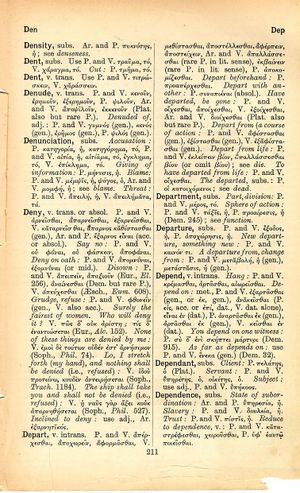deny: Difference between revisions
(CSV3) |
m (Text replacement - "<b class="b2">Eum.</b>" to "''Eum.''") |
||
| Line 8: | Line 8: | ||
<b class="b2">Deny on oath</b>: P. and V. ἀπομνύναι, ἐξομνύναι (or mid.). | <b class="b2">Deny on oath</b>: P. and V. ἀπομνύναι, ἐξομνύναι (or mid.). | ||
<b class="b2">Disown</b>: P. and V. ἀπειπεῖν, ἀπαξιοῦν (Eur., ''El.'' 256), ἀναίνεσθαι (Dem. but rare P.), V. ἀπεύχεσθαι (Aesch., | <b class="b2">Disown</b>: P. and V. ἀπειπεῖν, ἀπαξιοῦν (Eur., ''El.'' 256), ἀναίνεσθαι (Dem. but rare P.), V. ἀπεύχεσθαι (Aesch., ''Eum.'' 608). | ||
<b class="b2">Grudge, refuse</b>: P. and V. φθονεῖν (gen., V. also acc.). | <b class="b2">Grudge, refuse</b>: P. and V. φθονεῖν (gen., V. also acc.). | ||
Revision as of 11:57, 7 August 2017
English > Greek (Woodhouse)
v. trans. or absol.
P. and V. ἀρνεῖσθαι, ἀπαρνεῖσθαι, ἐξαρνεῖσθαι, V. καταρνεῖσθαι, ἄπαρνος καθίστασθαι (gen.), Ar. and P. ἔξαρνος εἶναι (acc. or absol.).
Say no: P. and V. οὐ φάναι, οὐ φάσκειν, ἀποφάναι.
Deny on oath: P. and V. ἀπομνύναι, ἐξομνύναι (or mid.).
Disown: P. and V. ἀπειπεῖν, ἀπαξιοῦν (Eur., El. 256), ἀναίνεσθαι (Dem. but rare P.), V. ἀπεύχεσθαι (Aesch., Eum. 608).
Grudge, refuse: P. and V. φθονεῖν (gen., V. also acc.).
Surely the fairest of women. Who will deny it? V. πῶς δʼ οὐκ ἀρίστη; τίς δʼ ἐναντιώσεται (Eur., Alc. 152).
None of those things are denied by me: V. ἐμοὶ δὲ τούτων οὐδέν ἐστʼ ἀρνήσιμον (Soph., Phil. 74).
Lo, I stretch forth (my hand), and nothing shall be denied (i. e., refused): V. ἰδοὺ προτείνω, κουδὲν ἀντειρήσεται (Soph., Trach. 1184).
The ship shall take you and shall net be denied (i. e., refused): V. ἡ ναῦς γὰρ ἄξει κοὐκ ἀπαρνηθήσεται (Soph., Phil. 527).
Inclined to deny: use adj., Ar. ἐξαρνητικός.

